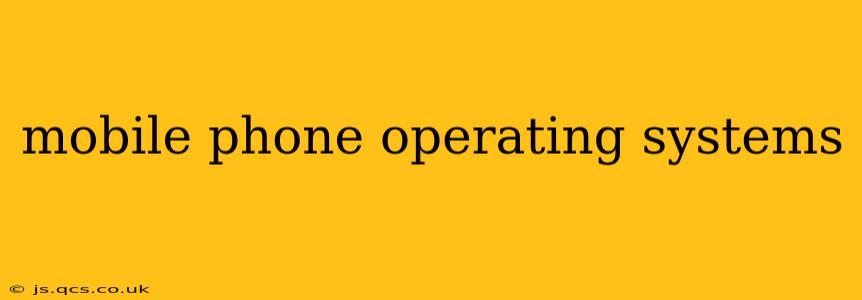The mobile phone market is dominated by a few key players when it comes to operating systems (OS). Understanding these systems, their strengths, and their weaknesses is crucial for anyone navigating the world of smartphones. This comprehensive guide explores the major mobile phone operating systems, addressing common questions and offering insightful analysis.
What are the main mobile operating systems?
The mobile OS landscape is primarily shaped by a few dominant players: Android, iOS, and, to a lesser extent, HarmonyOS.
-
Android: Developed by Google, Android is an open-source operating system, meaning its source code is publicly available for modification and distribution. This openness has led to a highly fragmented market with numerous variations tailored by different manufacturers (Samsung, Xiaomi, OnePlus, etc.). This flexibility allows for customization, but can also result in inconsistencies across devices.
-
iOS: Apple's proprietary operating system, iOS, is known for its user-friendly interface, strong security, and tight integration within the Apple ecosystem. It offers a highly controlled and consistent experience across all Apple devices. Updates are rolled out simultaneously, ensuring consistent functionality and security patches.
-
HarmonyOS: Developed by Huawei, HarmonyOS is a relatively newer entrant aiming to challenge the Android and iOS duopoly. It's designed to be compatible across a wide range of devices, including smartphones, tablets, and smart home appliances. Its adoption is still growing, and its long-term success remains to be seen.
What is the most popular mobile operating system?
Globally, Android holds the largest market share, boasting billions of active users. Its open-source nature and adaptability to various hardware configurations have contributed to its widespread adoption. However, iOS commands a significant premium market share, particularly in developed countries, due to its premium pricing and strong brand loyalty. HarmonyOS is still gaining traction and holds a smaller market share compared to Android and iOS.
Which mobile operating system is best for security?
Both iOS and Android prioritize security, but they approach it differently. iOS generally receives praise for its robust security features and its tightly controlled ecosystem, making it more difficult for malicious software to penetrate. Android, being open-source, faces more challenges in maintaining uniform security across all devices. However, Google continuously updates its Android OS and Google Play Protect actively scans apps for malware, mitigating many security risks. Ultimately, the "best" system depends on individual needs and priorities, as both platforms offer strong security measures.
What is the difference between Android and iOS?
The core difference lies in their philosophies: Android emphasizes flexibility and customization, while iOS prioritizes simplicity and a consistent user experience. Android offers more freedom in terms of app stores, widgets, and customization options, while iOS offers a more streamlined and intuitive interface with a focus on ease of use. These differences extend to app ecosystems, app design, and the overall user experience. Android devices generally offer a wider range of price points, while iOS devices tend to be positioned at the higher end of the market.
Which mobile OS is better for developers?
The choice of operating system for developers depends on their target audience and priorities. Android's large market share makes it an attractive platform, but the fragmentation of Android devices necessitates thorough testing across various devices and screen sizes. iOS, with its smaller but more homogenous user base, often simplifies development and testing. The higher average spending power of iOS users may also be a factor influencing developers' decisions.
How do I choose the best mobile operating system for me?
Choosing the "best" mobile OS is highly subjective and depends on individual preferences and needs. Consider the following factors:
- Budget: Android offers a much wider range of price points, while iOS devices tend to be more expensive.
- Ecosystem: Do you already use Apple products? If so, sticking with iOS might be a seamless choice.
- Customization: Do you prefer extensive customization options or a simpler, more streamlined experience?
- App selection: While both platforms boast extensive app stores, some apps may be exclusive to one platform or the other.
- Security: Both offer strong security features, though iOS generally receives higher praise in this area.
By carefully evaluating these factors, you can make an informed decision and select the mobile operating system best suited to your individual requirements. The mobile OS landscape is constantly evolving, so staying updated on the latest features and updates will help ensure you make the most informed choice possible.
